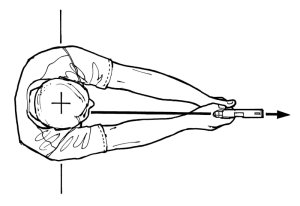
High-Threat Contract Jobs
Contracting Overseas
The Pro’s and Con’s to Contracting Overseas
Story and photographs by Robert Spunga * Photographs by Danielle Breteau
Today, there are hundreds of thousands of men and women working overseas on various contracts and making good money, probably two to three times what they can make in the United States. On top of that, they may even be eligible for the foreign earned income exclusion, which in 2018 meant that the first $99,200 of their total income earned overseas was excluded from being taxed at the Federal level (it’s higher for 2019). However – and I can’t emphasize this enough – they are earning it!

Naturally, the best-paying jobs are in high-threat environments such as Iraq, Afghanistan, Syria, etc. Yes, these places can be dangerous. Since 2001 over 3,300 civilian contractors have been killed, and almost 95,000 were injured in Iraq and Afghanistan alone. The vast majority were third-country nationals, or TCNs, from places like Peru, Colombia, Philippines, Fiji, Uganda, Kenya, Egypt, Pakistan and so on. There were thousands of casualties from the US as well. In reality, the odds are that you will not be injured, but you need to be aware that the possibility certainly does exist.

On the other hand, there are thousands of jobs in less risky places such as Kuwait, Qatar, India, Saudi Arabia, Africa, Antarctica (no kidding! – there are actually waiting lists) and South America. It all depends on your skills, your sense of adventure and what you are willing to put up with.

As an overseas contractor you are often working in “austere environments.” This can range from living in a large tent with 15 other people and eating MREs (meal ready to eat) all the way up to enjoying individual rooms with a private bathroom, Internet, satellite television and access to gymnasiums, movie theaters, tennis courts and well-run dining facilities. It all depends on the company you are working for and where the contract is being performed.

Let’s talk about the pay. Again, this is all dependent upon where you are working, what you are doing, how long you are expected to be away from home and the living conditions. Generally, as a contractor you can expect that your living accommodations and food will be included as part of the deal. Pay can be as low as $15 per hour for unskilled labor or simple administrative functions. But remember, this is usually based on a 12-hour day and six days per week. That works out to $1,080 per week, $5,400 per month. Not bad for those who have very few skills, plus there isn’t much in the way of expenses to pay either. At the other end of the spectrum, there are contracts currently paying more than $1,800 per day! Do the math and you can see that that is a butt-load of cash. However, you need very special skills and experience, plus there is probably a very high risk of being seriously injured, captured by bad guys and having to wear those unflattering orange jumpsuits, and/or killed. Is the risk worth it to you and your family?

Getting a job and how much you can earn comes down to several things:
What documented skills you have?
Whether or not you have or can obtain a security clearance;
What you are willing to put up with?
Were you in the military? If so, what was your MOS or occupation specialty? If you were in combat arms, were you in special operations, a grunt infantryman, military police, sniper, artillery? What about military aviation – pilot, jet engine mechanic, helicopter crewman? How about a background in intelligence – analyst, collection specialist, interrogator, translator? There is also combat engineer – plumbers, machinists, surveyors, draftsman, masons, and carpenters. Similarly, logisticians are highly desired – warehouseman, inventory specialist, shipping, motor pool, etc. You get the picture. Almost anything you did while in the military is desired by contractors.

But what if you were never in the military? Not to worry. If you were in law enforcement (preferably some form of SWAT) and there is a verifiable record of that, there are many options, especially if you are looking for security positions.

Almost any job you can think of can be found overseas, but companies are going to need proof that you can do what you say you can. This is mostly due to liability potentials, not to mention the company does not want to hire someone and pay for their travel, only to find out after a few weeks that they are not what they originally claimed to be. There are enough posers out there – don’t be one because you will be exposed eventually!

Security clearances are huge, especially with government contracts. At a minimum you will have to be able to pass a basic background check. One of the biggest disqualifiers is heavy debt. Why? The thinking goes, if you owe a great deal of money, you will be more likely to be tempted by bribes. Yes, it doesn’t make sense because you want to get the money to pay off those debts but then they won’t hire you. It has never been said that government logic makes any sense.

Now, pay attention because this one is important: Do not lie on the forms. Let me say it again: do not lie on the forms. Tell the truth, the whole truth and nothing but the truth. The investigators will find out. Don’t be embarrassed. The investigators have seen everything before. They also know that no one is perfect and that we humans all make bad decisions at some point in our lives. If you have a reasonable explanation of why you were arrested 15 years ago for indecent exposure/urinating in public, just tell them what happened. (“I was drunk, came out of a bar at 2 in the morning, and peed against the door of another car thinking it would be funny. Unfortunately, the officers sitting in that unmarked car failed to see the humor of the situation!”) We’ve all done stupid stuff.

Of course, there is no guarantee that you will receive the clearance, but if they find out something that you didn’t disclose, that is an almost automatic disqualification. Even if the job doesn’t require a security clearance, any legitimate company is going to run a background check prior to employment.
Dead Foot Arms

It is also highly advisable to clean up your Facebook account and any other social media sites where you have posted pictures and information. Those hilarious photos of you passed out at a party next to the toilet in a pool of vomit may invoke wonderful warm memories for you, but your future employer isn’t going to look at them in exactly the same light. Or you could just put some strict privacy settings in place. However, in the long run, it is probably better to do a good scrub of your life on the Internet. You’d be amazed at how easy it is to dig up information about someone online.
What are you willing to put up with? Can you live in a tent with a bunch of other guys in a remote, hot, dusty location for weeks on end, peeing in bottles or sharing a drafty wooden outhouse, enduring occasional rocket and mortar attacks and eating only military rations or local food?
Can you work with people from foreign cultures who are very strange to you? How about personal space? Again, the idea of personal space is different in every culture. Some of these folks will stand right up next to you while they talk. If you keep backing away they are going to think something is wrong and be offended.

Personal hygiene is also different. Many people around the world don’t bath nearly as often as Americans and have some pretty strong body odors. And even if they are clean, they may smell different due to the foods they eat. You also may or may not be allowed to talk to the local women. What is a common occurrence in America may be highly insulting to other cultures, such as exposing the bottom of your shoe when crossing your legs.
Do your homework about where you want to work and decide what you can and cannot tolerate. Remember, you are in other people’s country, and as the old saying goes, “when in Rome, do as the Romans do.”

How about the hours? Many overseas contracts expect a 72-hour work week. Yes, you read correctly: a 72-hour work week, usually 12 hours per day, six days per week. Some might have you work every day of the week for 30 or more days before you are given a few days break. Contracts pay well, but they expect you to work hard. You will be away from home, meaning away from family and friends for months on end. Can your marriage survive that? What about your kids? Then again, some couples without children or who have an empty nest can double their income with both husbands and wives earning money by working on the same contract. This is an excellent way to quickly build a retirement nest egg.


You have to have thick skin and a high tolerance for huge egos, and general stupidity because you will run into a lot of that. You may have supervisors who you think are complete morons, and they may very well be. They may only be a supervisor because they have been there longer than you. However, they may also have some reason to enforce a policy, which, while not making any sense to anyone on the ground, makes perfect sense back at corporate headquarters, so the supervisor has no choice but to push it down. Hopefully, they argued the point, but most likely they just rolled over and implemented the new guidance from HQ without so much as a whimper because they want to keep their job. If you really don’t like working for a company, and especially if you think they are asking you to do something illegal or unsafe, start looking for another company to work for. Be fair warned, though: The grass may look greener on the other side, but when you jump that fence, you may find that’s only due to an overwhelming amount of BS.

Overseas contracting is not for everyone. However, it will give you the chance to make pretty good money, you will see and experience things and places you probably never would otherwise, make some great friends, probably meet some people who you will hate for the rest of your life, and give you some bragging rights with the folks back home. Like many things in our lives, it is all up to you and how you make the best of it. Take advantage of the opportunities, get some experience to put on your resume, and have a good time. Always keep a sense of humor. It will be an adventure. But remember the old saying: “Adventure is never fun while it is happening!”
Good luck! AmSJ



